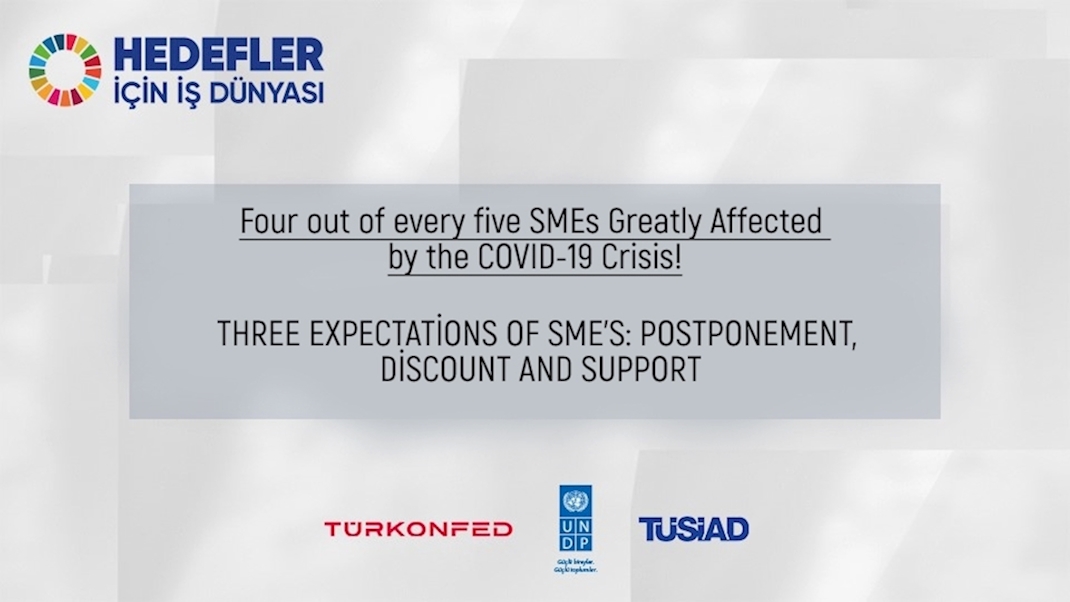The "COVID-19 Business Impact and Needs Survey" carried out by the Business for Goals Platform in coordination with TÜRKONFED, TÜSİAD and UNDP revealed the effects of the coronavirus epidemic on businesses. According to the survey, representing the seven regions of Turkey where 780 enterprises from 47 cities participated, 36% of micro and small-sized enterprises have suspended their activities. While the rate of enterprises that stated their turnover decreased by more than half exceeded 50%, this rate increased to 71% in Southeast Anatolia. The rate of businesses stating they were not affected by the epidemic remained at 3%. According to the survey, three primary expectations of SMEs in combating coronavirus are deferred invoice, tax and SSI payments with 80 percent, tax reduction and financial support with 77 percent.
Four out of every five SMEs Greatly Affected by the COVID-19 Crisis!

April 5, 2020-Istanbul / The coronavirus (Covid-19) epidemic not only causes a global health crisis, but also seriously affects the economy. In the times when many businesses from various sectors decided on suspending or decelerating the production worldwide, Business for Goals Platform conducted a survey to identify the effects of the outbreak on businesses in Turkey. TURKONFED, TUSIAD and UNDP carried out the "Covid-19 Business Impact and Needs Survey" in coordination, with the participation of 780 enterprises from 47 cities in Turkey, representing the seven regions. The economic effects of the coronavirus epidemic on businesses were revealed strikingly with the survey, in which the predictions and measures of the businesses for the course of the crisis were investigated.
Coronavirus hit small businesses the most
While 62% of businesses participating in the online survey conducted between March 23-27, 2020 stated that they were greatly affected by the coronavirus epidemic, the rate of businesses who said they were not affected remained at 3%. 11% of large enterprises and 36% of micro and small enterprises decided to cease their activities. While only 8% of all businesses stated that their businesses continue their routine without transition to crisis management, 32% emphasized partially and 29% undergoing an intensive crisis management.
Turnover fell more than 50%
According to the survey, while the turnover of more than half of the companies decreased by more than 50%, regional differences were noted in this decrease. 71% of the companies in the Southeastern Anatolia Region lost more than half in their turnover, followed by the Eastern Anatolia with 63%, the Eastern Black Sea with 62%, and the Mediterranean with 61%. Istanbul reflected the average of 48% of Turkey. Western Anatolia, on the other hand, attracted attention as the region least affected by the crisis so far with 32%.
Companies review their plans for 2020
Businesses participating in the Business for Goals Platform's survey did not come up with a common view on how long the crisis will last. While 29% of businesses stated that the coronavirus epidemic would affect the second quarter of this year, 18% predicted that the effects would extend until the fourth quarter.
Businesses that see the coronavirus epidemic as a serious threat are also reviewing their strategies in this direction. 79% of the companies participating in the survey stated that they reconsidered their 2020 strategy and activities. However, 34 out of every 100 participants stated that their businesses do not have a business continuity or contingency plan. While 95% of the companies stated that they took measures against the crisis, 85% of them consisted of improving hygiene conditions.
"Is the information you have about the coronavirus crisis sufficient for your planning and crisis management?" The answers to the question showed that businesses do not have access to accurate and reliable information. While 24% of the companies said their information was sufficient, 35% answered "no" and 41% said "not sure".
Businesses that cannot stay at home and do not have access to digital tools are in dire straits
51% of the enterprises participating in the survey stated that the infrastructure and digital facilities of their businesses are not sufficient for remote work. While this rate was 52% in Istanbul, it remained at 40% in the Aegean, 26% in the Mediterranean and 16% in Southeast Anatolia region. 70% of large companies and only 32% of small companies were able to provide the necessary conditions for working from home. While this rate was 45% in companies in the service sector, it was 34% in manufacturing and 29% in trade / retail. Leaving aside the industry conditions, these figures show that while some of the business world has made significant progress in digitalization, a large part of them also needs information transfer as well as allocating resources for digital transformation.
Three expectations of SMEs: Postponement, discount and support
In the survey, where the economic effects of the coronavirus were discussed, the participants were also asked about their expectations and demands. Accordingly, 80% of the participants require deferred invoice, tax and SSI payments; whereas 77% stated that they need tax relief. Other demands of SMEs were listed as financial support, postponement of loans, checks and debts. In addition, 26% of the participants pointed to the need for psycho-social support for employees, and 24% for medical and protective equipment support.
COVID-19 Business Impact and Needs Survey in Numbers
• 780 businesses from 47 cities, representing seven regions, participated in the survey.
• 69% of the participants were micro and small, 20% medium and 11% large scale businesses.
• 43% of the participants operate in the production / manufacturing sector, 37% in the service sector, and 20% in the trade / retail sector.
• Companies from the construction, food-beverage and textile-ready-made clothing industry make up 33% of all participants.